|
|
|
Sort Order |
|
|
|
Items / Page
|
|
|
|
|
|
|
| Srl | Item |
| 1 |
ID:
157785
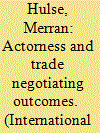

|
|
|
|
|
| Summary/Abstract |
In 2014, the EU concluded Economic Partnership Agreements (EPAs) with several African, Caribbean and Pacific (ACP) regions. These EPAs represent some of the most advanced examples of interregional cooperation. Yet, the outcomes of EPA negotiations are not the same across all regions. This article investigates differences in negotiated outcomes and argues that regional actorness – the ability of regions to become identifiable, to aggregate the interests of member states, to formulate collective goals and to make and implement decisions – influences regions’ ability to navigate interregional trade negotiations. In a comparison of the actorness and negotiated outcomes of West Africa and the SADC EPA Group, the article shows that actorness matters for international negotiations: regions with higher levels of actorness can negotiate better outcomes even under conditions of stark power asymmetry.
|
|
|
|
|
|
|
|
|
|
|
|
|
|
|
|
| 2 |
ID:
074495
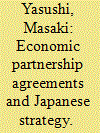

|
|
|
| 3 |
ID:
073995
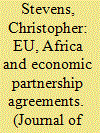

|
|
|
|
|
| Publication |
2006.
|
| Summary/Abstract |
Sub-Saharan African (SSA) is negotiating a new trade regime with the European Union (EU), under the threat of increased barriers against its exports if agreement is not reached before 2008. This article examines the potential impact on regional integration of the Economic Partnership Agreements (EPAs) being negotiated. Both sides pay lip service to greater regional integration, which is a stated objective of EPAs. But the article provides research evidence suggesting that EPAs will weaken regionalism, and in so doing adds to the literature on what happens when external powers attempt to use leverage to press trade policy change. Based on an analysis of SSA's trade with the EU, the article shows that countries may be encouraged to reinforce rather than eliminate barriers to the free circulation of goods between them, because of the choices they make in the details of their trade regimes with Europe. It also establishes a methodology that can be applied to new data as the negotiations progress.
|
|
|
|
|
|
|
|
|
|
|
|
|
|
|
|
| 4 |
ID:
116889
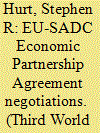

|
|
|
|
|
| Publication |
2012.
|
| Summary/Abstract |
This article focuses on the negotiation of Economic Partnership Agreements (epas) which form the central focus of the commitments made in the Cotonou Agreement, signed in 2000 by the European Union and the African, Caribbean and Pacific (acp) states. epas are part of a much wider trend witnessed since the creation of the World Trade Organization (wto), characterised by the proliferation of bilateral free trade agreements. The article argues that both the material and ideational interests of the EU need to be considered alongside the historical context of EU-acp relations. The EU is making a concerted effort to 'lock in' neoliberalism across the seven different sub-regions of the acp group by negotiating epas that include both reciprocal trade liberalisation and various 'trade-related' issues. In this way epas will go beyond the requirements for wto compatibility, resulting in a reduction of the policy space for acp states to pursue alternative development strategies. The article then considers the potential developmental impact of epas with reference to the negotiations with seven of the 15 member states of the Southern African Development Community (sadc). It is argued that the EU is promoting 'open regionalism', which poses a threat to the coherence of the regional project in southern Africa.
|
|
|
|
|
|
|
|
|
|
|
|
|
|
|
|
| 5 |
ID:
074973
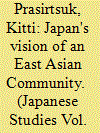

|
|
|
|
|
| Publication |
2006.
|
| Summary/Abstract |
The article offers a Thai perspective on Japan's vision of an East Asian Community. It argues that Japan has so far earned positive responses from Bangkok on three major initiatives-economic partnership agreements (EPAs), capacity building and financial cooperation in the region. In particular the Japan-Thailand EPA and development partnership for capacity building in Southeast Asia have been well received in Bangkok. Such responses, however, are being pursued from Thailand's own perspective of national interest.
|
|
|
|
|
|
|
|
|
|
|
|
|
|
|
|
| 6 |
ID:
102400
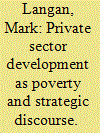

|
|
|
|
|
| Publication |
2011.
|
| Summary/Abstract |
Private sector development (PSD) has emerged as a core component of donor strategies aimed at making free markets work for 'the poor' through assistance to business sector capacity in low-income states. PSD initiatives cannot be understood, however, as technical exercises aimed solely at promoting development through business competitiveness. Instead they serve as normative concessions through which developmentally questionable market-opening has been rationalised by donors in pursuit of lucrative commercial opportunities in emerging economies. Examining the European Union's (EU) PSD framework in bilateral relations with the African, Caribbean and Pacific (ACP) states, the article examines the utilisation of PSD discourse in the 'development branding' of Economic Partnership Agreements (EPAs). PSD discourse is seen to facilitate a 'double-veiling' of asymmetric ACP-EU trade ties via legitimising images of equitable market-opening and the trickle-down of business wealth to 'the poor'. Nevertheless, the reality of reciprocal trade structures combined with Europe's anaemic PSD resources bears little resemblance to the strategic illusions of PSD. In particular, the interventions of Europe's Centre for the Development of Enterprise (CDE) in cotton and textiles sectors in East Africa are seen to have dubious outcomes for 'development' in ACP former colonies.
|
|
|
|
|
|
|
|
|
|
|
|
|
|
|
|
| 7 |
ID:
163652


|
|
|
|
|
| Summary/Abstract |
The EU’s proposal to renew the EU-ACP Agreement in spite of a number of signals pointing in the opposite direction is, inter alia, the unintended consequence of independent decisions taken in three different policy areas (trade, environment, and foreign and security affairs). The common unintended consequence that the three decisions shared would not have materialised if the European Commission had not purposefully triggered it to justify its vision of future EU-ACP relations. These findings challenge the prevailing and superficial usage of the notion of the unintended as a synonym for unanticipated and undesirable, and demonstrate that unintended consequences do not necessarily presuppose lack of anticipation, but may well be the result of calculation by policymakers.
|
|
|
|
|
|
|
|
|
|
|
|
|
|
|
|
| 8 |
ID:
141894


|
|
|
|
|
| Summary/Abstract |
This article investigates the regional dynamics of African agency in the case of negotiations on an Economic Partnership Agreement (EPA) between the EU and a group of Southern African countries, known as SADC-Minus. I argue that these negotiations were shaped by a pattern of differentiated responses to the choice set on offer under the EPAs by SADC-Minus policy makers and by a series of strategic interactions and power plays between them. I offer two contributions to an emerging literature on the role of African agency in international politics. First, I argue for a clear separation between ontological claims about the structure–agency relationship and empirical questions about the preferences, strategies and influence of African actors. Second, I suggest that, in order to understand the regional dynamics of African agency, it is important to pay close attention to the diversity and contingency of African preferences and to the role of both power politics and rhetorical contestation in regional political processes.
|
|
|
|
|
|
|
|
|
|
|
|
|
|
|
|
| 9 |
ID:
101833
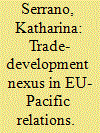

|
|
|
|
|
| Publication |
2011.
|
| Summary/Abstract |
For almost 40 years, relations between the European Union and African, Caribbean and Pacific (ACP) countries centred on trade and development policy. The partnership survived various challenges and evolved into an institutionalised model for North-South relations. In reaction to internal and external forces of change, in the Cotonou Agreement (2000) the EU introduced to its relations with the developing world a new trade-development paradigm to be implemented via Economic Partnership Agreements. The latter are intended to be innovative foreign policy instruments, functioning as development tools and trade liberalisation mechanisms. Against the background of current internal restructuring of EU foreign policy and an increasingly politicised development agenda, this article undertakes an enquiry into the nature of the trade-development nexus in EU-Pacific Island countries (PICs) relations. The analysis is based on a theoretical framework which employs assumptions and findings related to IR theory, referring in particular to realism and dependency theory. A critical examination of EU policies shaping the trade-development nexus reveals that it is a rather flexible foreign policy tool, equipped with an auto-adjustment mechanism to ensure the balance of EU trade and development objectives. From PICs' perspective, its predictability and therefore developmental value, may, however, be diminished.
|
|
|
|
|
|
|
|
|
|
|
|
|
|
|
|
|
|
|
|
|